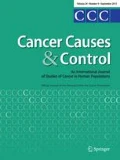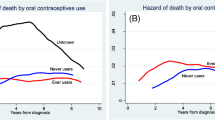We examined the association between recent oral contraceptive (OC) use and the risk of breast cancer in data from a large population-based case-control study in the United States. Cases (n=6,751) were women less than 75 years old who had breast cancer identified from statewide tumor registries in Wisconsin, Massachusetts, Maine, and New Hampshire. Controls (n=9,311) were selected randomly from lists of licensed drivers (if aged under 65 years) and from lists of Medicare beneficiaries (if aged 65 through 74 years). Information on OC use, reproductive experiences, and family and medical history was obtained by telephone interview. After adjustment for parity, age at first delivery, and other risk factors, women who had ever used OCs were at similar risk of breast cancer as never-users (relative risk [RR]=1.1, 95 percent confidence interval [CI]=10–1.2). Total duration of usealso was not related to risk. There was a suggestion that more recent use was associated with an increased risk of breast cancer; use less than two years ago was associated with an RR of 1.3 (CI=0.9–1.9). However, only among women aged 35 to 45 years at diagnosis was the increase in risk among recent users statistically significantly elevated (RR=2.0, CI=1.1–3.9). Use prior to the first pregnancy or among nulliparous women was not associated with increased risk. Among recent users of OCs, the risk associated with use was greatest among non-obese women, e.g., among women with body mass index (kg/m2) less than 20.4, RR=1.7, CI=1.1–2.8. While these results suggest that, in general, breast cancer risk is not increased substantially among women who have used OCs, they also are consistent with a slight increased risk among subgroups of recent users.
Similar content being viewed by others
References
Malone KE, Daling JR, Weiss NS. Oral contraceptives in relation to breast cancer. Epidemiol Rev 1993; 15: 80–97.
Kay CR, Hannaford PC. Breast cancer and the pill—a further report from the Roval College of General Practitioners' Oral Contraception Study. Br J Cancer 1988; 58: 675–80.
Lund E, Meirik O, Adami HO, Bergstrom R, Christoffersen T, Bergsjo P. Oral contraceptive use and premenopausal breast cancer in Sweden and Norway: possible effects of different pattern of use. Int J Epidemiol 1989; 18: 527–32.
McPherson K, Vessey MP, Neil A, Doll R, Jones L, Roberts M. Early oral contraceptive use and breast cancer: results of another case-control study. Br J Cancer 1987; 56: 653–60.
Meirik O, Lund E, Adami HO, Bergstrom R, Christoffersen T, Bergsjo P. Oral contraceptive use and breast cancer in young women: a joint national case-control study in Sweden and Norway. Lancet 1986; 2: 650–4.
Miller DR, Rosenberg L, Kaufman DW, Stolley P, Warshauer ME, Shapiro S. Breast cancer before age 45 and oral contraceptive use: new findings. Am J Epidemiol 1989; 129: 269–80.
Olsson H, Moller TR, Ranstam J. Early oral contraceptive use and breast cancer among premenopausal women: final report from a study in southern Sweden. JNCI 1989; 81: 1000–4.
Paul C, Skegg DC, Spears GF. Oral contraceptives and risk of breast cancer. Int J Cancer 1990; 46: 366–73.
White E, Malone KE, Weiss NS, Daling JR. Breast cancer among young U.S. women in relation to oral contraceptive use. JNCI 1994; 86: 505–14.
Brinton LA, Daling JR, Liff JM, et al. Oral contraceptives and breast cancer risk among younger women. JNCI 1995; 87: 827–35.
Rookus MA, van Leeuwen FE. Oral contraceptive use and risk of breast cancer in women aged 20–54 years. The Netherlands Oral Contraceptive and Breast Cancer Study Group. Lancet 1994; 2: 926–30.
Rosenberg L, Palmer JR, Clarke EA, Shapiro S. A case-control study of the risk of breast cancer in relation to oral contraceptive use. Am J Epidemiol 1992; 136: 1437–44.
Pike MC, Henderson BE, Krailo MD, Duke A, Roy S. Breast cancer in young women and use of oral contraceptives: possible modifying effect of formulation and age at use. Lancet 1983; 2: 926–9.
Ursin G, Aragaki CC, Paganini-Hill A, Siemiatycki J, Thompson WD, Haile RW. Oral contraceptives and premenopausal bilateral breast cancer: a case-control study. Epidemiology 1992; 3: 414–9.
Wingo PA, Lee NC, Ory HW, Beral V, Peterson HB, Rhodes P. Age-specific differences in the relationship between oral contraceptive use and breast cancer. Obstet Gynecol 1991; 78: 161–70.
WHO Collaborative Study of Neoplasia and Steroid Contraceptives. Breast cancer and combined oral contraceptives: results from a multinational study. Br J Cancer 1990; 61: 110–9.
Weinstein AL, Mahoney MC, Nasca PC, Leske MC, Varma AO. Breast cancer risk and oral contraceptive use: results from a large case-control study, Epidemiology 1991; 2: 353–8.
Thomas DB, Noonan EA. Risk of breast cancer in relation to use of combined oral contraceptives near the age of menopause. WHO Collaborative Study of Neoplasia and Steroid Contraceptives. Cancer Causes Control 1991; 2: 389–94.
Yuan JM, Yu MC, Ross RK, Gao YT, Henderson BE. Risk factors for breast cancer in Chinese women in Shanghai. Cancer Res 1988; 48: 1949–53.
Romieu I, Willett WC, Colditz GA, et al. Prospective study of oral contraceptive use and risk of breast cancer in women. JNCI 1989; 81: 1313–21.
Jick H, Walker AM, Watkins RN, et al. Oral contraceptives and breast cancer. Am J Epidemiol 1980; 112: 577–85.
Ellery C, MacLennan R, Berry G, Shearman RD. A case-control study of breast cancer in relation to the use of steroid contraceptive agents. Med J Aust 1986; 144: 1769–76.
La Vecchia C, Parazzini F, Negri E, et al. Breast cancer and combined oral contraceptives: an Italian case-control study. Eur J Cancer Clin Oncol 1989; 25: 1613–8.
Schlesselman JJ, Stadel BV, Korper M, Yu W, Wingo PA. Breast cancer detection in relation to oral contraception. J Clin Epidemiol 1992; 45: 449–59.
Skegg DC. Potential for bias in case-control studies of oral contraceptives and breast cancer. Am J Epidemiol 1988; 127: 205–12.
Newcomb PA, Storer BE, Longnecker MP, et al. Lactation and a reduced risk of premenopausal breast cancer. New Engl J Med 1994; 330: 81–7.
Reeves MJ, Newcomb PA, Remington PL, Marcus PM. Determinants of breast cancer detection among Wisconsin (United States) women, 1988–90. Cancer Causes Control 1995; 6: 103–11.
Breslow NE, Day NE. Statistical Methods in Cancer Research. Vol. 1. The Analysis of Case-control Studies. Lyon, France: International Agency for Research on Cancer, 1980; IARC Sci. Pub. No. 32.
Longnecker MP, Newcomb PA, Mittendorf R, et al. The reliability of self-reported alcohol consumption in the remote past. Epidemiology 1992; 3: 535–9.
Reeves MJ, Newcomb PA, Remington PL, Marcus PM, MacKenzie WR. Body mass and breast cancer: relationship between method of detection and stage of disease. Cancer 1996; 77: 301–7.
Dawson DA. Trends in use of oral contraceptives — Data from the Health Interview Survey. Family Plan Perspec 1990; 22: 169–72.
Voight LF, Weiss NS. Epidemiology of endometrial cancer. In: Surwit E, Alberts D, eds. Endometrial Cancer. Boston, MA (USA): Kluwer Academic Publishers, 1989: 1–21.
Colditz GA, Hankinson SE, Hunter DJ, et al. The use of estrogens and progestins and the risk of breast cancer in postmenopausal women. N Engl J Med 1995; 332: 1589–93.
Thomas DB. Oral contraceptives and breast cancer. Contraception 1991; 43: 597–642
Anderson TJ, Battersby S, King RJ, McPherson K, Going JJ. Oral contraceptive use influences resting breast proliferation. Hum Pathol 1989; 20: 1139–44.
Stolley PD, Tonascia JA, Sartwell PE, et al. Agreement rates between oral contraceptive users and prescribers in relation to drug use histories. Am J Epidemiol 1978; 107: 226–35.
Rosenberg MJ, Layde PM, Ory HW, Strauss LT, Rooks JB, Rubin GL. Agreement between women's histories of oral contraceptives and physician records. Int J Epidemiol 1983; 12: 84–7.
Additional information
Authors are with the University of Wisconsin Comprehensive Cancer Center, Madison, WI, USA (Dr Newcomb, Ms Trentham Dietz); NIEHS Epidemiology Branch, Research Triangle Park, NC (Dr Longnecker); Fred Hutchinson Cancer Research Center, Seattle, WA (Dr Surer); Department of Obstetrics and Gynecology, Pritzker School of Medicine, The University of Chicago, Chicago, IL (Dr Mittendorf); Department of Community and Family Medicine, Dartmouth Medical School, Hanover, NH (Dr Baron); Boston University, School of Public Health, Boston, MA (Dr Clapp); Department of Epidemiology and Department of Nutrition, Harvard School of Public Health, and Channing Laboratory, Harvard Medical School and Department of Medicine, Brigham and Women's Hospital, Boston, MA (Dr Willett). Address correspondence to: Dr Polly A. Newcomb, University of Wisconsin-Madison Comprehensive Cancer Center, 1300 University Ave., #4780, Madison, WI 53706, USA. Supported by Public Health Service (National Cancer Institute) grants R01 CA 47147 and R01 CA 47305.
Rights and permissions
About this article
Cite this article
Newcomb, P.A., Longnecker, M.P., Storer, B.E. et al. Recent oral contraceptive use and risk of breast cancer (United States). Cancer Causes Control 7, 525–532 (1996). https://doi.org/10.1007/BF00051885
Received:
Accepted:
Issue Date:
DOI: https://doi.org/10.1007/BF00051885




